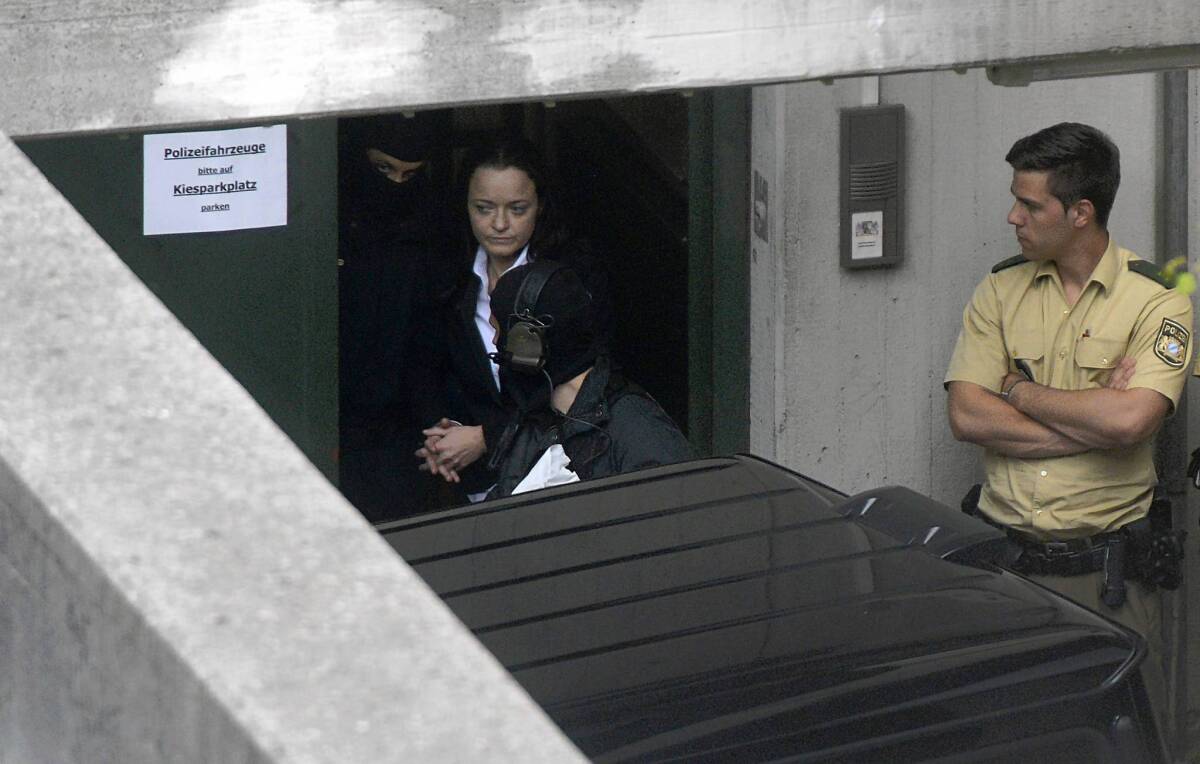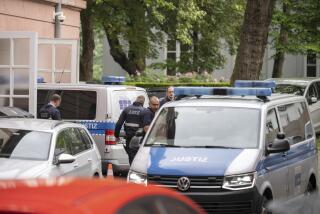High-profile neo-Nazi trial begins in Germany

- Share via
BERLIN — The surviving member of an alleged neo-Nazi cell accused of a string of racially motivated murders went on trial Monday in a case that has forced Germany to confront the extent to which racism continues to pervade society here.
Beate Zschaepe, 38, is accused of complicity in the murders of eight Turks, a Greek and a policewoman between 2000 and 2007. Her trial in Munich is expected to raise questions about the failings of security services and police, who suspected the slain immigrants of having connections to organized crime and refused to pursue tips about a far-right gang.
Protesters outside court waved red-and-white Turkish national flags and held up black-and-white photographs of the victims. Video footage showed a scuffle breaking out between police and a small group of women who were demonstrating.
Zschaepe is also accused of involvement in at least two nail bombings and 15 bank robberies carried out by two alleged accomplices, Uwe Mundlos and Uwe Boehnhardt, who died in an apparent suicide pact in 2011 after a bank robbery went wrong.
The German press has dubbed Zschaepe “die Nazi-Braut” — the Nazi bride — for her relationships with the two men.
Proceedings were adjourned after defense lawyers accused the presiding judge, Manfred Goetzl, of bias. Zschaepe has complained that although the defendants’ lawyers are searched as they enter the court building, the prosecution, judges and court staff are not.
The lawyer for another defendant, Ralf Wohlleben, 38, who is accused of supplying the gang with weapons and silencers, has also complained that whereas Zschaepe has three public defenders, his client only has one. Besides Wohlleben, Zschaepe is being tried alongside three other men accused of assisting the cell.
The case was put off until May 14, when the judge is expected to decide whether to recuse himself from the trial, as the defense has requested.
After the deaths of Mundlos and Boehnhardt — and an explosion at a suspected safe house used by the gang in Zwickau, eastern Germany — police discovered DVDs in which the cell introduced itself as the National Socialist Underground. The DVDs showed the Pink Panther cartoon character going on a tour of Germany, counting off the murder victims. Some of the bodies had been photographed soon after their deaths.
Police and intelligence services have been criticized for failing to share information and pursue tips. The head of Germany’s domestic intelligence service resigned in July after staff acknowledged shredding files relevant to the case, and a parliamentary committee has been set up to look into what went wrong.
German Chancellor Angela Merkel has apologized to victims’ families and acknowledged official failings. In an interview with the German newspaper Die Welt before the trial, Semiya Simsek, the daughter of victim Enver Simsek, said: “Prejudices against foreigners and Turks are deeply rooted in the mind. These impressions have influenced the investigations over the years and steered them in the wrong direction.”
In addition to Wohlleben, the other codefendants are Carsten Schultze, 33, accused of supplying the gang with weapons and silencers; Andre Eminger, 33, accused of being an accessory in two of the bank robberies and a bombing in the old town of the city of Cologne; and Holger Gerlach, 39, accused of supporting a terrorist organization.
Zschaepe’s lawyers have said she will remain silent during the trial, which is expected to last two years.
Vasagar is a special correspondent.
More to Read
Sign up for Essential California
The most important California stories and recommendations in your inbox every morning.
You may occasionally receive promotional content from the Los Angeles Times.










